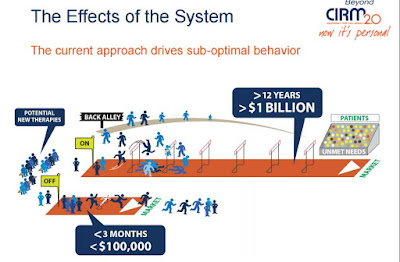The flap involved allegations of lies and questionable motives. Along the way certain death was mentioned, and one writer was accused of "stealing hope" from seriously ill persons. Personal animus charges were raised along with questions about ill-informed rhetoric.
The hooha was set off by an op-ed piece by UC Davis stem cell scientist Paul Knoepfler who wrote an op-ed in the San Francisco Chronicle (see here and here). It chastized the agency and its president, Randy Mills, for a risky and "political" effort to change regulations by the federal Food and Drug Administration. Knoepfler said patients could be put at risk.
The piece triggered harsh comments that were carried by the Chronicle at the end of the article. In addition to Knoepfler, individuals involved in the exchange included Jeanne Loring, head of the stem cell program at the Scripps Institute in La Jolla; Judy Roberson, a Sacramento patient advocate for Huntington's disease, and a person identified only as "Jeff." He wrote,
"What's Knoepler's real beef?....Poor Paul is not getting the money from CIRM he used to get. So his attitude is 'screw patients,' I want my lab funded like it used to be. Nauseating!!!"CIRM is the abbreviation for the formal name of the state stem cell agency, officially known as the California Institute for Regenerative Medicine. Its board includes Jeff Sheehy, who told the California Stem Cell Report that he is not the Jeff commenting on Knoepfler's article.
The anonymous "Jeff" said,
"Has any of (Knoepfler's) research led to a development candidate that might lead to a treatment in the future? Or is he just a stem cell scientist opining about something he knows very little or nothing about(the FDA)? Maybe he 'heard' something from somebody and that gave him just the hook he needed to attack CIRM and Mills, both of whom he obviously has personal animus towards."
Loring largely sided with Knoepfler. She also wrote,
"Jeff, why are you questioning Paul's motives? What are your motives? Do you work for CIRM? As you know, a person's profession doesn't define his/her sphere of knowledge. If something is important to you, you can research it and gain expertise."
Roberson, who favors the CIRM effort to loosen regulations to bring therapies into widespread use, said patient safety is important. She also said,
"But for patients and their families with a 100 percent fatal genetic disease like Huntington's disease, we can withstand some risk because we are facing a gut-wrenchingly long, gruesome death anyway. We have no chemotherapy, no surgery, no radiation and sadly, no hope. We have NOTHING! And we'll continue to have nothing for many more decades if the FDA continues doing business as usual."Another reader, William Barnes, said,
"I suggest that Dr. Knoepfler consider how it feels to be suffering and near certain death and be denied a possible cure because Dr. Knoepfler doesn't think it's in their best interest....Let the individual patient decide! It’s their life! Why should the decision about someone’s life, possibly your loved one, be made by a distant and dispassionate academic?"
In addition to his research, Knoepfler produces a blog, The Niche, on stem cell science, regulation and policy. He took up the blog after a nasty bout with prostate cancer when he was in his 40s. Knoepfler is also the author of "Stem Cells: An Insider's Guide," a book aimed at helping patients understand stem cell science.









